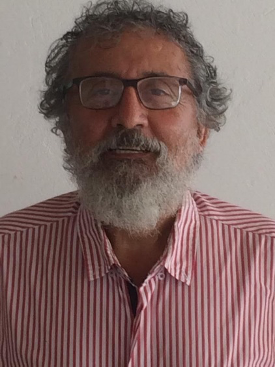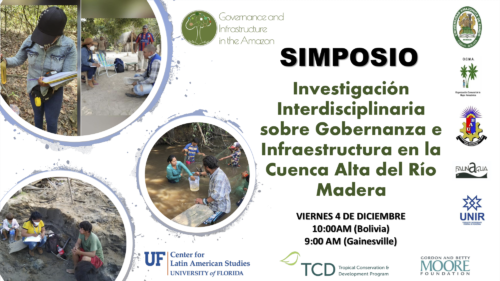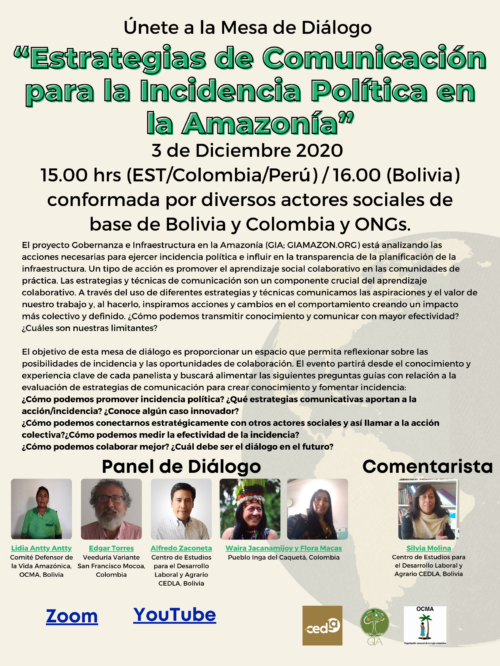As 2020 began, GIA launched our preliminary assessment of 55 cases of conservation strategies applied to infrastructure projects – based on consultations and workshops with partners in 4 regions – that identified promising strategies related to political mobilization and negotiation in collaboration with grassroots organizations.
For the past year, in spite of the Covid-19 pandemic, GIA partners have been working to learn more about advancing these strategies for infrastructure governance. In this newsletter, we share plans for consolidating and sharing this work over the next few months. We give brief updates on 8 GIA Working Groups, report on recent events organized by some of the Working Groups, and ask you to SAVE THE DATE OF A FINAL GIA WORKSHOP. Happy reading!
PLEASE MARK YOUR CALENDARS FOR THE FINAL GIA WORKSHOP
Three afternoon virtual meetings
Proposed Dates: May 24, 25, 27
We will complete GIA’s first phase with a 3-afternoon virtual workshop to summarize what we have learned and discuss the next steps for our Community of Practice and Learning.
The workshop will consolidate GIA’s experiences and learning about the effectiveness, and opportunities for improvement, of tools and strategies to influence governance. We invite all GIA participants to reflect and discuss the following key questions:
- How have internal and external factors affecting the effectiveness of strategies to promote infrastructure governance, and why?
- How has the combination of strategies created synergies and promoted effectiveness, and why?
- How can knowledge generation and communication effectively contribute to infrastructure governance?
- How can different organizations most effectively collaborate, recognizing sectoral and cultural differences?
- How can GIA participants and others incorporate these findings and learning into improved conservation strategies for future work?
GIA Working Groups – Ongoing Practice and Learning
Based on the priority strategies related to political mobilization and negotiation in collaboration with grassroots organizations identified from 55 cases of GIA partners’ conservation strategies applied to infrastructure, UF and GIA partners are working on the specific topics and questions listed below. These groups will
- continue to meet from January to March, to exchange experiences and consolidate learning;
- report their experiences and lessons to the broader GIA community in April and early May; and
- participate in the final workshop of GIA’s first phase to consolidate GIA’s experiences and learning about the effectiveness, and opportunities for improvement, of tools and strategies to influence governance.
Below is a list of our GIA Working Groups and their title. We also list the coordinators of each group and invite all GIA participants to contact them to learn more and consider participating in the discussion and analysis.
- Group 1: Comparative analysis of cases with positive results
- Coordinator
- Jazmin Gonzales Tovar – jazmin.gt@ufl.edu
- Coordinator
- Group 2: Intercultural Collaboration
- Group 3: Improving infrastructure governance in the Upper Madera
- Coordinators:
- Marliz Arteaga – marliz@ufl.edu
- Cecilia Sanjinez – doctorasanjinez@gmail.com
- Coordinators:
- Group 4: Community engagement in the IVV (Infraestructura Vial Verde) initiative in Colombia
- Coordinators
- Maryi Serrano – mserrano@fcds.org.co
- Vanessa Celino – lunacelino.dv@ufl.edu
- Coordinators
- Group 5: Stakeholder Engagement
- Coordinator
- Pamela Montero – pamela.monteroal@ufl.edu
- Coordinator
- Group 6: Communication for political impact (CMP 3)
- Coordinator
- Andrea Chavez – achavez@ufl.edu
- Coordinator
- Group 7: Legal and policy approaches (CMP 4.3)
- Coordinators
- Juliana Santiago – julianasantiago@ufl.edu
- Neiva Araujo – araujo.nc@gmail.com
- Coordinators
- Group 8: Effectiveness and impact of the GIA Community of Practice and Learning
- Coordinator
- Claudia Romero – romero@ufl.edu
- Coordinator
Please click here to find more information about the focus of each group and the specific questions they are addressing.
GIA’s Working Groups – Digital Events
Working Group 4: Upper Madera – FOSPA Dialogue
On November 26, 2020, GIA partnered with Organizacion Comunal de la Mujer Amazonica (OCMA) and CEDLA to host “Dialogue On Development Of Amazonian Peoples Between: Opportunities And Threats.” The event featured Vincent Vos and Edgar Torres.
Watch the full recording here.
Working Group 4: Upper Madera – UAP Research Symposium
On December 4, 2020, GIA helped organize the Symposium “Transdisciplinary Research on Governance and Infrastructure in the Amazon,” at which five students from the Amazon University of Pando, Bolivia (UAP) defended thesis research that was carried out in partnership with communities impacted by the Madera Hydroelectric Complex.
Watch the video recording and read more here.
Working Group 6: Communication for Political Impact
On December 3, a round-table discussion called “Communication Strategies for Political Advocacy in the Amazon” was held with the participation of grassroots organizations from Colombia and Bolivia and an NGO from Bolivia. The objective of the event was to reflect on the possibilities of advocacy and the opportunities for collaboration between actors to address challenges associated with infrastructure projects. The event was based on the following guiding questions about the effectiveness of communication strategies to create awareness and influence governance:
- How can we achieve political impact? What communication strategies contribute to action/governance? Do you know of an innovative case?
- How can we strategically connect with other social actors for collective action?
- How can we measure the effectiveness of advocacy?
- How can we collaborate better? How should we continue this dialogue in the future?
The panelists emphasized the importance of creating strategic alliances for the construction of narratives that help cast light on crucial issues and demands and amplify the voices of the actors themselves. Innovative cases were presented such as articulation with local populations, strengthening of intergenerational leadership, and recovery of ancestral activities. Communication must be engaging and influence the emotional states of the target audience to achieve political advocacy. It is also important to have a strategic communication plan that specifies the target audiences and ensures that the key ideas are understood by the recipients who can become supporters for a specifically targeted cause.
To read a complete synthesis or watch the recording here.













